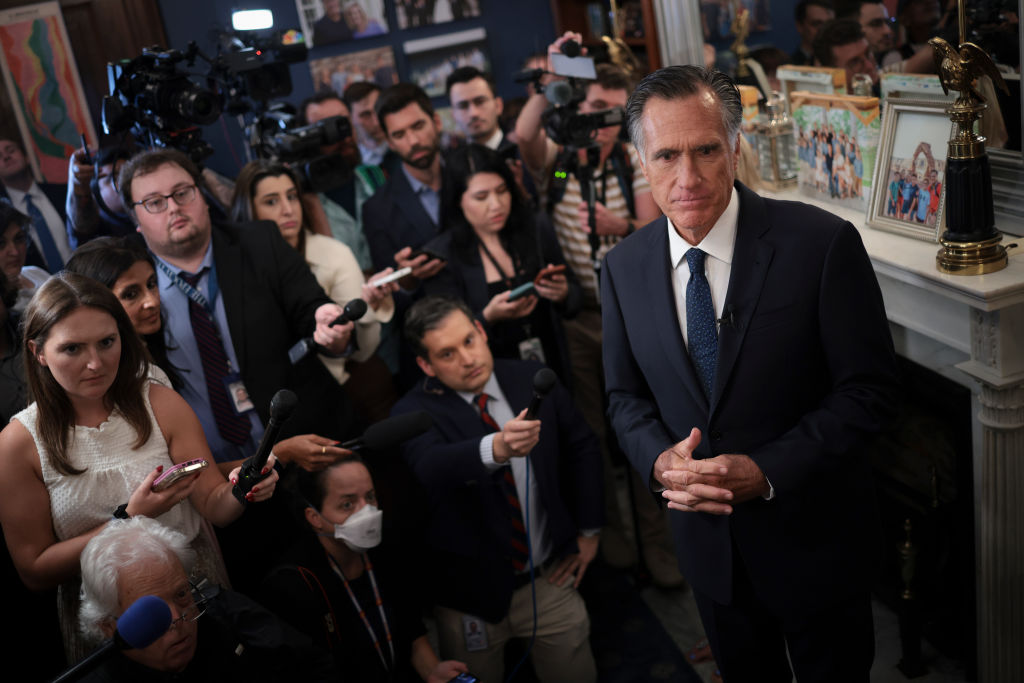Hello and happy Sunday! I hope you’re lucky enough to be enjoying the crisp air and cooler temperatures of late summer. In the Ohio bureau we’ve got the A/C off and the windows open, and it’s delightful. The transition from summer to fall is one of my favorite times of year: The heat dissipates but the sun is shining, we don’t have to yell at the kids to mow the lawn quite so often, and I get to watch a lot of football.
Not all transitions are so welcome—political transitions in particular. I’ve been thinking about that a lot since Mitt Romney announced Wednesday he would not seek reelection to the Senate in 2024. We’ve seen more than a few Republicans with integrity depart Congress in recent years—either retiring or losing primary elections to Trump-aligned candidates—but Romney’s decision to step away hits harder than most. If this marks the end of his political career, his legacy may well be that he was the right man at the wrong time—twice.
He had the misfortune of earning the Republican nomination in 2012, running against an incumbent president with a loyal base and plenty of support from the mainstream media. Remember when he said that Russia was our biggest geopolitical threat and President Barack Obama said, “The 1980s are calling to ask for their foreign policy back”? And when the New York Times editorial board wrote that, “His comments display either a shocking lack of knowledge about international affairs or just craven politics. Either way, they are reckless and unworthy of a major presidential contender”? I do.
Romney didn’t need to run for the Senate in 2018—he could have easily stayed out of the spotlight and enjoyed time with his grandchildren. But he surveyed the landscape and realized that someone had to speak out against Donald Trump—and that he was uniquely suited to do so. And so he ran.
Romney might not be remembered for any sweeping legislative victories in the Senate, but he did make history. While some Republicans found their moral courage after the Capitol was sacked, his was on display the whole time. He was the first senator to vote to convict an impeached president of his own party—and then he became the first one to do so twice.
In Boiling Frogs, Nick offers up a reflection on Romney that is well worth your time, but this particular passage stands out:
One suspects he might have given the Senate another go if he thought the GOP was trending away from demagoguery. He hung on through two impeachments, four indictments, and an insurrection that nearly got him killed, hoping that that series of blows would finally knock some sense into the voters of his party about their choice of leaders. What he got for his patience was Trump leading the GOP primary by 50 points according to the latest national poll.
In 2012, Romney warned us about Russia and he was mocked. Two years later, Vladimir Putin illegally annexed Crimea and Russian-backed separatists began an insurgency in Ukraine’s Donbas region. Think of what could have been avoided if we’d listened.
In 2016, Romney warned us not to nominate Donald Trump. He gave what was described at the time as an unprecedented speech—the GOP’s most recent nominee speaking out against the leading candidate for the next nomination. “Donald Trump is a phony, a fraud,” he said. “His promises are as worthless as a degree from Trump University. He’s playing the American public for suckers: He gets a free ride to the White House and all we get is a lousy hat.” Think of what could have been avoided if we’d listened.
Romney even used his retirement announcement to offer a smart suggestion: “It’s time for a new generation of leaders. They’re the ones that need to make the decisions that will shape the world they will be living in.” Later, talking to reporters, he was more specific. “It would be a great thing if both President Biden and former President Trump would stand aside.” I am not holding my breath that anyone will listen this time, either.
On that cheery note, thanks for reading. Here’s some good stuff you might have missed.
Kevin doesn’t think much of the laws that Hunter Biden is accused of breaking—the president’s son allegedly lied on a federal firearms form and possessed a gun while being a user of illegal drugs—but he is a big fan of the rule of law. There were rules, and Hunter is accused of breaking them. After noting that Julius Caesar reportedly divorced his wife after she was caught up in a salacious scandal on the grounds that “Caesar’s wife must be above suspicion,” Kevin writes: “Those laws should be enforced. They should be enforced with especial vigor when it comes to those who wield the power of the state and those who make their livings—a very nice living in Hunter Biden’s case—from their remora-like parasitic access to the political power held by their daddies.”
Speaker Kevin McCarthy announced Tuesday that he’s opening an impeachment inquiry into President Joe Biden for his alleged involvement in his son’s international business dealings. Not everyone in Congress was thrilled with the idea, but can you guess which House member Michael Warren is talking about here? “He’s argued that relying on Rep. Marjorie Taylor Greene as any kind of impeachment authority is ‘absurd.’ He’s blasted GOP lawmakers for engaging in ‘impeachment theater.’ And he’s dismissed impeachment as a ‘shiny object’ that distracts Republicans in Congress from more important issues.” Was it Minority Leader Hakeem Jeffries, or Rep. Adam Schiff, or maybe Rep. Jamie Raskin, who played an important role in Donald Trump’s second impeachment? Nope. It was Republican Rep. Ken Buck of Colorado. And he’s no squish: Michael notes that Buck’s office is outfitted with standard-issue GOP decor—a “Back the Blue flag,” an American-flag-themed AR-15, and a red MAGA hat. So why is he opposed? He explains in the interview.
Did you catch Joe Biden reminiscing this week about how he traveled to Ground Zero the day after the 9/11 attacks? In the G-File, Jonah discusses Biden’s long record of self-flattering falsehoods that place him at important points in history or attempt to show he was decades ahead of the conventional wisdom on social issues. And he’s not letting him off the hook just because of his age. “That’s one of the problems with getting old: Your most deep-seated characteristics become more pronounced,” he writes. “Like aged wine, the things that make you distinctive become more developed and obvious. A lot of people age not just into their character but into their caricatures. Biden and Trump were always insecure braggarts, but those qualities command more bandwidth now as compensation for the deterioration of the cognitive tools that used to keep those qualities in relative check.”
Here’s the best of the rest:
- It looks like Dave McCormick will be running for the U.S. Senate in Pennsylvania. McCormick ran in the 2022 primary but lost to Mehmet Oz, who then lost to John Fetterman in the general election. Now the GOP has a chance to oust Democratic Sen. Bob Casey, and state Republicans are optimistic. David Drucker, Audrey, and Michael Warren have the details in Dispatch Politics.
- House Speaker Kevin McCarthy is facing heat from members of his own party on both government funding and impeaching President Biden. Did he buy himself some time by opening an impeachment inquiry? Harvest reports in Uphill.
- In addition to providing us with a weekly dose of wisdom on trade, tariffs, and industrial policy—along with an occasional helping of nachos—Scott Lincicome has been hard at work on a project for the Cato Institute. It’s called Defending Globalization, and it just launched. He talks about the project—and offers a robust defense of globalization—in the latest Capitolism.
- The Biden administration authorized the release of $6 billion in frozen Iranian funds to complete a hostage swap with the Islamic Republic, and Reuel Marc Gerecht and Ray Takeyh think the money has a lot more to do with appeasing the clerics on the nuclear front than anything else.
- Reporting from Tel Aviv, Charlotte details the steps Israel is taking to deter the multifront terrorist threat from Iran and Iranian-backed groups like Hezbollah. And she notes that those threats also endanger U.S. forces in the region.
- On the pods: David Lat continues his guest-hosting gig on Advisory Opinions while Sarah is on maternity leave. He and David French weigh in on McCarthy’s impeachment inquiry and discuss a big victory for the Fellowship of Christian Athletes at the 9th Circuit. On the Dispatch Podcast, Kevin talks to veteran Texas politician Kel Seliger about the other big impeachment story: that of Texas Attorney General Ken Paxton. And this week’s solo Remnant comes to you from Idaho, where Jonah is taking a break from a big road trip with the dogs. Tune in for his thoughts on Mitt Romney, Russia, and the difference between authoritarianism and totalitarianism.







Please note that we at The Dispatch hold ourselves, our work, and our commenters to a higher standard than other places on the internet. We welcome comments that foster genuine debate or discussion—including comments critical of us or our work—but responses that include ad hominem attacks on fellow Dispatch members or are intended to stoke fear and anger may be moderated.
With your membership, you only have the ability to comment on The Morning Dispatch articles. Consider upgrading to join the conversation everywhere.